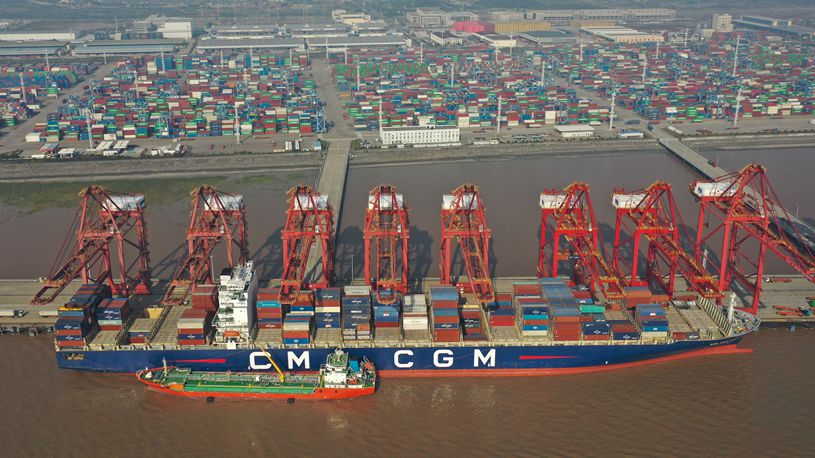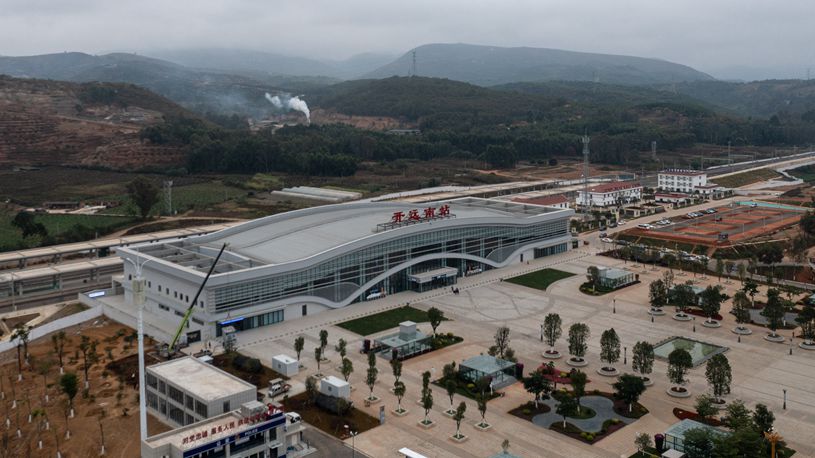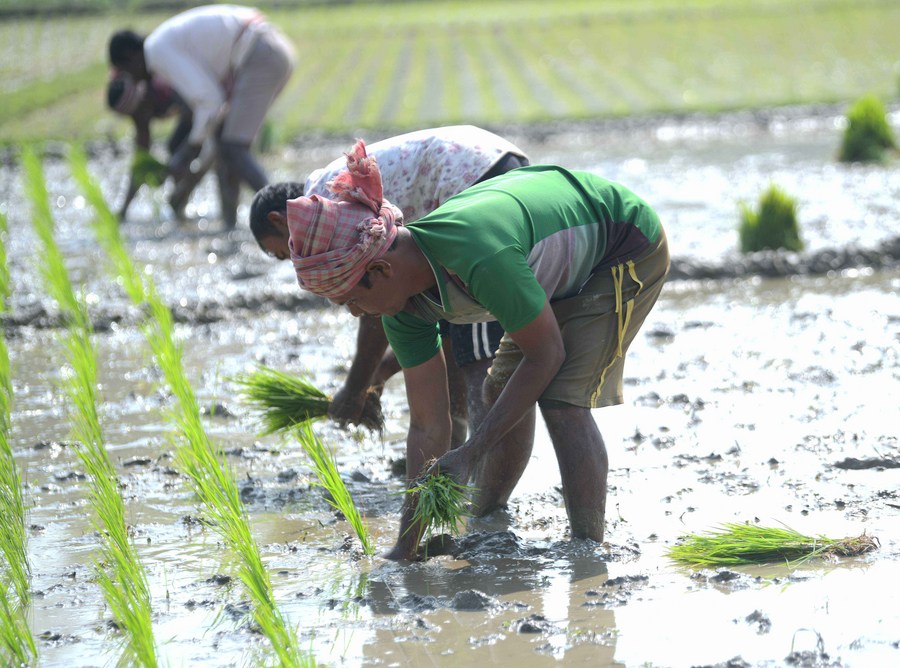
Farmers plant seedlings at a paddy field on the outskirts of Agartala, the capital city of India's northeastern state of Tripura, Feb. 16, 2022. (Str/Xinhua)
Export restrictions on agricultural products have also put a question mark on India's credibility of being a trusted supplier. Trade analysts say in global trade, buyer-seller relationships are built over years of mutual trust and credibility to deliver on time.
by Peerzada Arshad Hamid
MUMBAI, Dec. 23 (Xinhua) -- India's unpredictable farm export policy is likely to affect farm income with a recent report by the World Trade Center (WTC) Mumbai pointing out that it may affect the export performance of over 100 districts in the country.
"The government of India's restriction on export of primary and processed agriculture commodities such as rice, wheat, semolina, refined wheat flour and sugar in recent months may affect exports and farm income in 112 districts which are dealing in shipment of these commodities," said the WTC Mumbai in the report.
"In order to prevent shortage of essential primary and processed food commodities in the domestic market, the government of India prohibited or imposed export duty on shipment of these commodities in recent months."
The WTC Mumbai endeavors to integrate India with the globe by promoting international trade and investment.
According to an analysis by M Visvesvaraya Industrial Research and Development Centre (MVIRDC) WTC Mumbai, these export restrictive measures will adversely impact the farm income and export-oriented activities across 112 districts that are cultivating or processing these commodities.
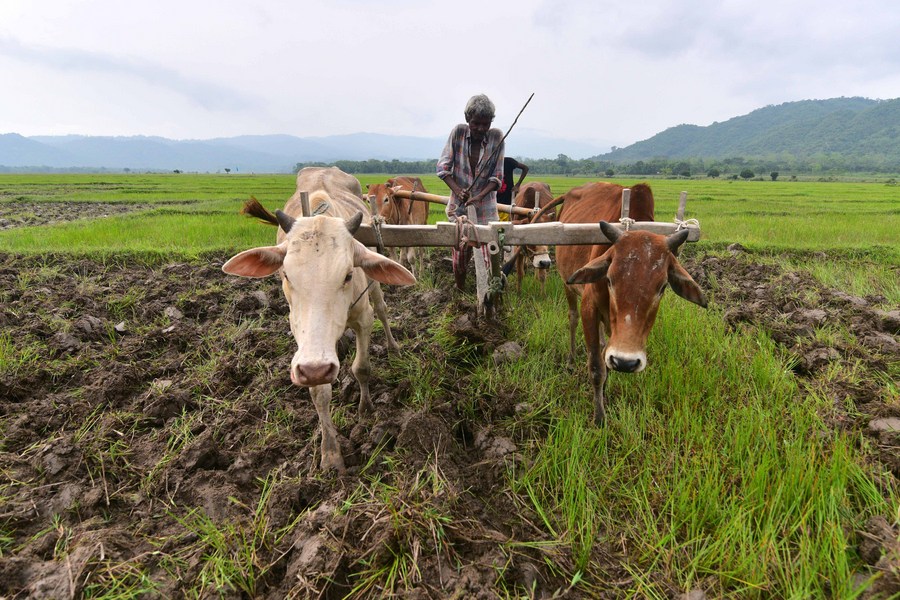
A farmer ploughs his field for paddy plantation in Nagaon district of India's northeastern state of Assam, June 9, 2022. (Str/Xinhua)
In May this year, the Indian government restricted the export of raw, refined and white sugar by requiring exporters to seek permission from the directorate of sugar under the ministry of consumer affairs.
On Aug. 27, India prohibited the export of maida (refined wheat flour), wheat, flour, semolina, and wholemeal atta (wheat flour).
On Sept. 9, India prohibited the export of broken rice and imposed a duty on the export of brown rice and wholly milled rice.
In 2018, the federal government introduced an agriculture export policy to enhance farm exports from 30 billion U.S. dollars to more than 100 billion dollars in the next few years.
The policy was introduced with the aim to boost farmers' income after experts suggested that India needs a predictable agriculture export policy to enhance agro exports and increase the income of farmers.
In 2021-22, India's export of agriculture and allied commodities stood at 50 billion dollars, a WTC Mumbai report said.
"Out of 11,127 goods exported from India, 1,401 are agriculture and related commodities such as dairy, meat, fish, beverages and other processed goods. These 1,401 agriculture and related commodities are exported by 492 districts across the country," the report said.
The 2018 agriculture export policy assures against any export restriction on processed agricultural products and all kinds of organic products.
"At the same time, the policy allows the government of India to impose export restrictions on a few commodities which are essential for food security in consultation with the relevant stakeholders, ministries, and a high-level committee," the report said.
However, in the last decade, the Indian government banned or imposed quantitative limits on the export of key agro products such as rice, wheat, sugar, maida, onion, tomatoes, and other commodities to ensure adequate availability of these products in the local market.
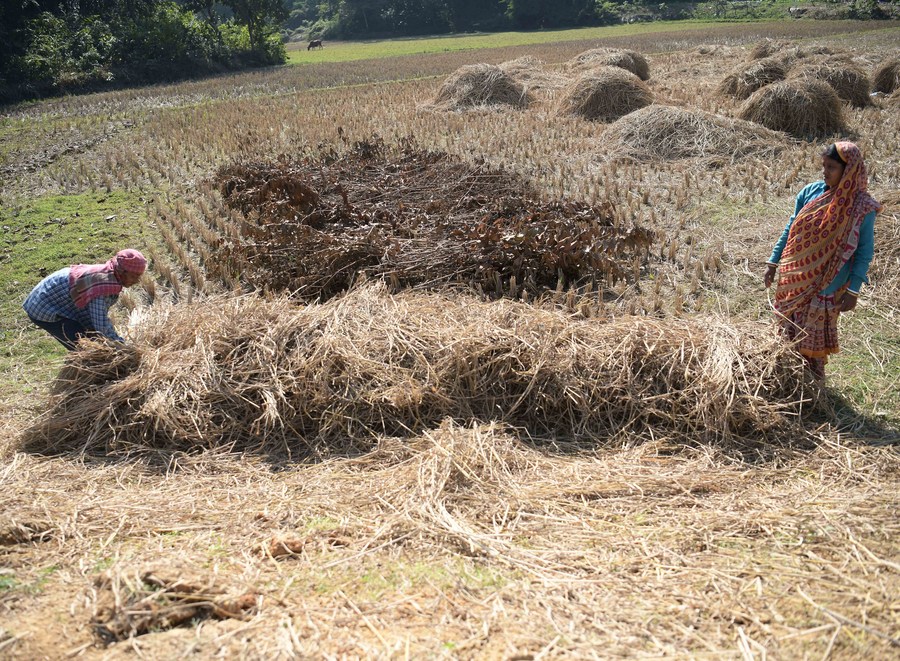
Farmers bundle dry rice straw in a field on the outskirts of Agartala, the capital city of India's northeastern state of Tripura, Jan. 7, 2022. (Str/Xinhua)
"The government restricts exports by taking various policy measures, some of which are the imposition of minimum export prices, export duty, export bans, export quota, export capping, and export permits," the report said. "Such frequent use of policy restrictions creates uncertainty and reduces the incentive for farmers to grow these products at a commercial scale to supply to the global market."
The step to restrict the export of certain items is taken to control the increase in prices at home and cater to the domestic market.
Experts say such changes in the export policy can dent India's image as an exporter.
"These policy changes also hurt the image of India as a reliable supplier of these agro commodities," the report said. "Even though India is the second largest producer of food grains, fruits, vegetables, pulses, groundnut, sugar, and other commodities, we rank the eighth in world export of agro products. In order to utilize the untapped agriculture export potential in the country, India needs to incentivize export-oriented value addition by ensuring policy stability in the agriculture export sector."
Last year the World Trade Organization (WTO) said export restrictions and prohibitions imposed by India seem to be in contradiction with its main trade policy goal, which was to increase its share of global exports from 2 percent in 2015 to 3.5 percent by 2020.
The global trade body said New Delhi continued to use trade policy to meet non-trade policy objectives, changing policies constantly, thus diminishing the predictability of the trade policy regime.
Export restrictions on agricultural products have also put a question mark on India's credibility of being a trusted supplier. Trade analysts say in global trade, buyer-seller relationships are built over years of mutual trust and credibility to deliver on time.
"If you as an exporter can't deliver on time the relationship is broken and after that, it is hard to regain or earn that trust," said Sahil Shah, an exporter based in New Delhi. "This government's sometimes open and sometimes close approach towards agriculture policy is giving a severe blow to people associated with agricultural export." ■




